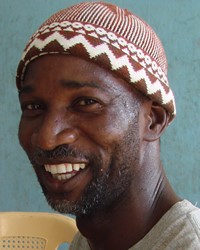Soninke in Côte d'Ivoire

Photo Source:
Link Up Africa
|
Send Joshua Project a map of this people group.
|
| People Name: | Soninke |
| Country: | Côte d'Ivoire |
| 10/40 Window: | No |
| Population: | 252,000 |
| World Population: | 3,359,200 |
| Primary Language: | Soninke |
| Primary Religion: | Islam |
| Christian Adherents: | 0.00 % |
| Evangelicals: | 0.00 % |
| Scripture: | Portions |
| Ministry Resources: | No |
| Jesus Film: | Yes |
| Audio Recordings: | Yes |
| People Cluster: | Soninke |
| Affinity Bloc: | Sub-Saharan Peoples |
| Progress Level: |
|
Introduction / History
Have you heard of the Ghana Empire? It existed from 750 to 1240 AD in West Africa. The Soninke people were the founders and rulers of the Ghana Empire. When the empire ended, the Soninke were scattered across West Africa including the nation of Cote d'Ivoire, also known as Ivory Coast. The Soninke make up only about one percent of the population of Cote d'Ivoire. Cote d'Ivoire gained its independence from France in 1960. The economy grew during the presidency of Félix Houphouët-Boigny who ruled the country with his one-party government until 1993. Since that time Cote d'Ivoire has suffered two civil wars and numerous human rights violations. Cote d'Ivoire became the leading world exporter of cocoa in 1979. Cocoa is used to make chocolate. Other exports include coffee, rubber and palm oil.
What Are Their Lives Like?
The Soninke live in the rural northern part of Cote d'Ivoire near the borders with Guinea, Mali and Burkina Faso. The main occupations of the Soninke are agriculture, animal husbandry and trade. The social structure and organization of the Soninke are typical of Mande-related people groups. They are farmers who raise sorghum, rice, peanuts, and their staple crop, millet. They also raise large numbers of goats, sheep, horses, chickens, and cattle. They do very little fishing and hunting, and trade is extremely important. The Soninke trade in the local markets. They also travel to markets in other regions to trade their goods. Today the Soninke have one of the highest rates of male labor migration in West Africa. Much of the male population is absent from the home doing migrant work, which often lasts from two to four years. With the women, old men and children left behind, a form of matriarchal (female-dominated) society has evolved. Most Soninke live in compact villages surrounded by their farm and grazing lands. Houses line both sides of the main street, and a mosque is typically located at the village square. Soninke marriages require the payment of a bride-price. In contrast to most neighboring tribes, the bride-price is given to the bride rather than her parents and becomes part of her dowry. They forbid pre-marital sexual relations. They accept polygamy (having more than one wife), with each man being limited to four wives by Islamic law. In the past, inheritances were passed down from fathers to sons. Muslim rules govern the dispersion of property: one-eighth goes to the widow, while equal shares go to each son and half shares go to each daughter. Soninke parents encourage their sons to pursue a secondary education while the daughters receive at best a primary education.
What Are Their Beliefs?
Soninke are Sunni Muslims heavily influenced by folk religion, a belief in natural spirits. The Soninke try to obey the teachings of the Koran and the prophet Mohammad. Sunnis believe that by following the Five Pillars of Islam that they will attain heaven when they die. However, Allah, the supreme God of the universe, determines who enters paradise. Sunnis pray five times a day facing Mecca. They fast the month of Ramadan. They attend mosque services on Friday. If a Muslim has the means, he or she will make a pilgrimage to Mecca once in his or her lifetime. Muslims are also prohibited from drinking alcohol, eating pork, gambling, stealing, using deceit, slandering, and making idols. The two main holidays for Sunni Muslims are Eid al Fitr, the breaking of the monthly fast and Eid al Adha, the celebration of Abraham's willingness to sacrifice his son to Allah. Friday is the day of rest with Soninke attending their local mosques.
What Are Their Needs?
Among all the Soninke in Cote d'Ivoire, there are few if any Christians. Those who decide to follow Christ will suffer persecution. Therefore, evangelizing is extremely difficult. Most Soninke have not yet heard a clear presentation of the gospel in their heart language.
Prayer Points
Pray that the believers who will soon come from the Soninke will be established in the faith and share the love of Isa or Jesus with their family and friends. Pray that the Lord sends team of medical and agricultural experts to the Soninke in Cote d'Ivoire to tell them about Jesus and help with their practical needs. Pray that the Lord raises up a Disciple Making Movement among the Soninke in Cote d'Ivoire in this decade.